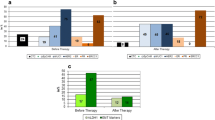Summary.
The incidence of local relapse after complete (R0) resection of solid tumors is largely determined by the skill of the surgeon, whereas metastatic relapse in distant organs is caused by pre- or perioperative systemic dissemination of tumor cells. The presence of individual disseminated tumor cells – e. g., in bone marrow as indicator organ – can be detected by sensitive immunocytochemical and molecular methods and is increasingly considered as a clinically relevant prognostic indicator. In contrast to solid metastases, isolated micrometastatic tumor cells are appropriate targets for intravenously applied anti-cancer therapeutics because they are easily accessible to macromolecules and immunologic effector cells. The majority of these tumor cells appear to be nonproliferating (i. e., in the G0 phase of the cell cycle), which may explain the failure of adjuvant chemotherapy. Adjuvant therapeutic strategies aimed at quiescent tumor cells are therefore of increasing interest. This therapeutic rationale has been tested and confirmed in a randomized clinical trial using antibody 17–1A in patients with non-metastatic colorectal carcinoma (UICC stage III). The antibody therapy kills also quiescent tumor cells (“dormant cells”) and is independent from a potential chemotherapy resistance of the tumor cells. As treatment for minimal residual cancer, the clinical use of antibody therapy could be envisaged in conjunction with chemotherapy, applied either in parallel or sequentially. The aim of this review is to present and discuss the current state of research in the field of diagnosis and therapy of minimal residual cancer.
Zusammenfassung.
Während das Auftreten und die Häufigkeit von Lokalrezidiven bei der R0-Resektion solider Tumoren weitgehend in der Hand des Operateurs liegt, sind Fernrezidive nach derzeitigem Kenntnisstand auf die bereits prä- oder perioperativ erfolgte, systemische Disseminierung von Tumorzellen zurückzuführen. Das Vorliegen von einzelnen, disseminierten Tumorzellen – z. B. im Knochenmark als Indikatororgan – ist im Rahmen eines erweiterten Tumorstagings durch sensitive immuncytochemische und molekulare Methoden nachweisbar und wird zunehmend als klinisch relevanter Prognosefaktor angesehen. Im Gegensatz zu soliden Metastasen stellen isolierte mikrometastatische Tumorzellen aufgrund ihrer Zugänglichkeit für Makromoleküle und immunkompetente Effektorzellen geeignete Ziele für intravenös appplizierte Therapeutica dar. Der überwiegend nicht mitotisch aktive Zustand (G0-Phase) dieser Tumorzellen könnte eine Ursache für das Versagen einer adjuvanten Chemotherapie sein. Daher rücken adjuvante Therapiestrategien, die auch gegen ruhende Zellen wirksam sind, zunehmend in den Mittelpunkt des Interesses. Diese therapeutische Rationale ist mit dem Antikörper 17–1A bei Patienten mit colorectalem Carcinom im Stadium UICC III nach R0-Resektion randomisiert untersucht und bestätigt worden. Die Antikörpertherapie zeichnet sich dadurch aus, daß Antikörper sich im Gegensatz zur Chemotherapie auch gegen mitotisch nicht aktive Tumorzellen („dormant cells“) richten und zudem unabhängig von möglichen Chemotherapieresistenzen wirken. Als eine gegen den Zustand der minimalen residualen Krebserkrankung gerichtete Therapie wäre der adjuvante Einsatz von Antikörpern zukünftig auch als Kombinationsbehandlung mit der Chemotherapie parallel oder sequentiell sinnvoll. Ziel dieser Übersicht ist es, den momentanen Stand der Forschung auf dem Gebiet der Diagnostik und Therapie der minimalen residualen Krebserkrankung zu erläutern.
Similar content being viewed by others
Author information
Authors and Affiliations
Rights and permissions
About this article
Cite this article
Pantel, K., Doeberitz, M., Izbicki, J. et al. Disseminierte Tumorzellen: Diagnostik, prognostische Relevanz, Phänotypisierung und therapeutische Strategien. Chirurg 68, 1241–1250 (1997). https://doi.org/10.1007/s001040050351
Issue Date:
DOI: https://doi.org/10.1007/s001040050351




